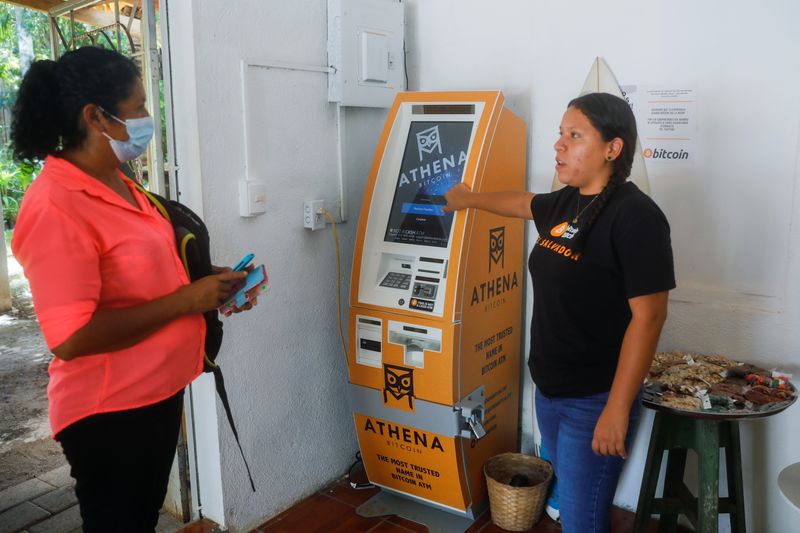By Tom Wilson and Karin Strohecker
LONDON (Reuters) - El Salvador has become the first country in the world to adopt bitcoin as legal tender, with President Nayib Bukele touting its use for its potential to help Salvadorans living abroad to send remittances back home.
Here's what the move means for bitcoin as a mainstream currency - and emerging markets such as El Salvador:
WHAT DOES THE LAW SAY?
El Salvador's law means bitcoin will have equal footing with the dollar, which became its official currency 20 years ago.
Making bitcoin "legal tender" means shops and businesses must accept it for goods and services, and they can choose to express prices in the currency.
Taxes can also be paid using bitcoin, though its use will be optional.
SO BITCOIN WILL BE USED LIKE DOLLARS?
It's too soon to tell.
Bitcoin's value has fluctuated wildly through its 12-year life, with regular daily double digit price moves rendering it impractical for commerce.
It remains little used for buying goods and services across the world, despite a growing number of major companies accepting it as payment.
El Salvador said the bitcoin-dollar exchange rate will be set by markets. Yet no detail has been given on how this will work in practice and whether and how vendors and businesses will reflect pricing in real-time or maybe through other mechanisms.
The government is guaranteeing convertibility to dollars at the time of transaction through a $150 million trust created at the country's development bank.
IS BITCOIN REALLY A CURRENCY NOW?
Bitcoin was designed as a currency, yet many investors see it as an asset more akin to gold than a replacement for dollars, euros or yen. Financial regulators and law enforcement worldwide are debating the status of cryptocurrencies, and how they should be regulated.
The jury is still out on whether the introduction of bitcoin to El Salvador will see it become more a transaction mechanism or take over the function of a currency in its own right.
IS IT THE START OF A WIDER TREND?
In theory, bitcoin offers a quick and cheap way to send money across borders without relying on traditional financial firms such as banks and remittance companies.
Backers say it could catch on in emerging markets particularly, where people lack access to traditional financial services and have to pay costly fees for sending and receiving money.
Yet converting bitcoin to and from local currencies in such economies tends to rely on informal brokers, requires know-how and is fraught with risk of scams and price fluctuations.
Analysts say it is too soon to tell whether El Salvador's move would start a wider trend of bitcoin adoption.
HOW WILL IT PLAY OUT IN EMERGING MARKETS?
El Salvador's experiment will provide the first opportunity for analysts to gauge the cryptocurrency impact on an economy.
Some warn the increased usage of cryptocurrencies will reduce the effectiveness of monetary policy.
While El Salvador is already using the greenback as its legal tender, other emerging economies who are on the cusp of dollarisation might find cryptocurrency use can amplify this, dampening the ability of central banks to act as lender of last resort.

Inflation is also in focus.
Bitcoin - like many other cryptocurrencies - has limited supply designed to mitigate inflationary effects. But experts predict any increasing business case for cryptocurrencies could spur the creation of new ones, which means overall supply is not limited and potentially proving inflationary.